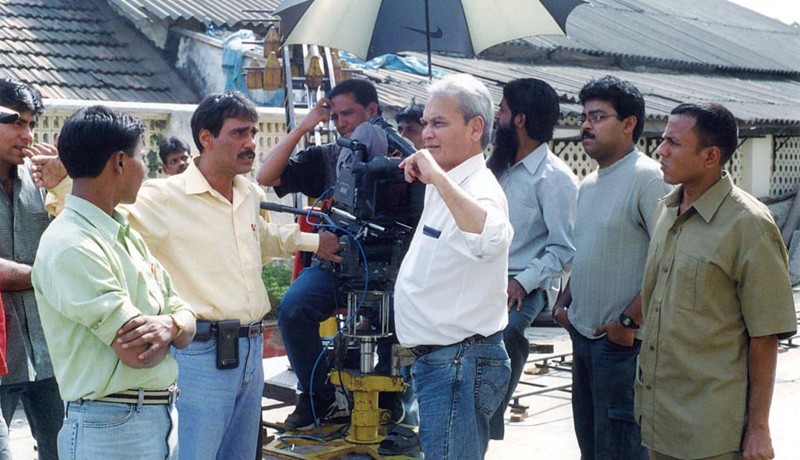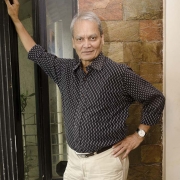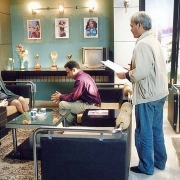
People

I’m a wanderer, a gypsy, continually looking for moorings; a prowler on the quest of the undefined,” says Vinod Pande, who has donned many hats in his eventful life: newsreader, broadcaster, advertising professional, filmmaker and author, among others.
Born in a village in Uttar Pradesh, where his father was a doctor at a government dispensary, Pande enjoyed a nomadic childhood. The exciting memories of “travelling as a child in a truck amid household goods to the new station and mother serving food cooked for the long travel; the sights and sounds; the hues and colours; the fields lacing the roads; the simple thrill of getting down to stretch or relieve yourselves” are still etched in his mind. In academics, he dabbled in various subjects—science, social work and law—before coming home to filmmaking. Pande established his credentials as a non-conformist filmmaker with Ek Baar Phir, Yeh Nazdeekiyan, Ek Naya Rishta, Star, Sach and Sins, among others. Undeterred by criticism that his films are too bold, Pande enjoys delving into the complexities that surround human behaviour and relationships. He has made a mark on television as well with offbeat serials such as Air Hostess, Reporter and Mera Humsafar.
As a writer, too, Pande has taken the road less travelled. His latest book, Saanvri: The Story of a Concubine, published by Niyogi Books, is about a woman who exploits the wanton carnality in men in a society that uses and abuses her. In an email interview with Suparna-Saraswati Puri, the octogenarian talks about his adventurous journey so far. Excerpts from the interview….
Tell us about your family.
I have three siblings: one sister, who is the eldest, and two brothers. I’m the middle brother.
What took you to London?
I migrated to London in May 1966. I used to work as a personnel officer with one of the Bajaj Group companies in Mumbai when I came to know about the Employment Voucher Scheme of the British government under which people from Commonwealth countries were being engaged for job requirements in the UK. Though I applied for a lark, to my surprise, the voucher arrived. That’s how I landed in London with dreams in my eyes.
How was London in those days?
The London of the 1960s and ’70s was deeply insular. The average Britisher was pretty rabid in his relationship with non-whites from the colonies. By the mid-’70s though, the scenario changed. The vibrant Indian immigrant community of Southall caught everybody’s eyes. In 1971, I made my first documentary, London Mein Bharat, on them.
Tell us about your brush with advertising.
After the maiden documentary, I was more or less unemployed. Someone suggested making cinema commercials. I made commercials, initially for Asian businesses and thereafter for British Airways (BA) and other groups. My campaigns for BA, Health Education Council, Bank of Credit & Commerce International, Life Insurance Corporation of India and Omax watches were quite popular.
How did you land a job with the British government?
I learnt there were vacancies in various government departments and knew that they were likely to recognise my postgraduate degree at least as a graduate equivalent. I was selected and ended up working in various district offices of the Inland Revenue Department for four years. The stint gave me the opportunity to enroll for a host of part-time courses in filmmaking at the City Literary Institute and the British Film Institute in London.
You also worked with the BBC.
I used to participate in radio plays with All India Radio. When I moved to London, I contacted BBC as they had Hindi transmissions. My stint with them as a broadcaster and newsreader helped me grow as a person. I became responsive and responsible for not only what my eyes and ears were to see and hear in real time but what I was to perceive on the basis of informed study.
As a filmmaker, what is paramount to you while casting?
As I come from a creative space that is not quite mainstream and escapist, my primary concern while casting has always been the character sketch. The only time I did not go on the external specifics of a character was when I cast Suresh Oberoi in Ek Baar Phir. I needed someone flamboyant. Suresh was nowhere near that, but the timber of his voice had me gripped.
Your films always explore unconventional ideas. Are they a reflection of your life?
I feel whatever you do by way of creative expression sprouts from your heart. Either you have lived the experience or witnessed it closely. Either way, it should have touched you and changed you in some fundamental way. Each time an idea has stared me in the face, it has been an unexpressed longing, probably seeking some kind of catharsis, especially in the case of bold subjects.
Your films and books exhibit a heightened treatment of sensuality and intimacy between characters.
It’s ironic that nude figures in museums or statues in a state of copulation in temples do not raise any hackles, but showing a couple in an act of intimacy in films is not appreciated. Nevertheless, I must admit that I invariably get drawn to challenging and gritty themes. Maybe my stint as a broadcaster has something to do with it. Our television serials, too, were vastly different from what was running at that time, both in concept and treatment. However, none of them had sexual content.
Apart from filmmaking, you have dabbled in online entertainment with your web series.
Cinema spoils you. The sheer scale of production in terms of actors, technicians and equipment and the matrix of the narrative become awe-inspiring. You start believing there is no life beyond this and become reluctant at trying anything else. But then, how do we get over our initial derision for 140 characters of a tweet to say something? Once we take up the cudgels, it comes, and comes beautifully! When ‘jump’ or ‘perish’ become the only options, you become the real discoverer; you become adept at telling stories simply, briefly and beautifully!
How was writing Saanvri different than your debut book Don’s Wife?
Writing Saanvri: The Story of a Concubine was comparatively easier as it had already been written as a full-fledged film script. In the case of Don’s Wife, it was a new journey with characters that were still emerging from behind the smokescreen at every turn. It was my first novel, hence exhausting and more fulfilling at the same time.
What next?
My next novel, Destiny, is by far the most complex and challenging in terms of characters and layers of emotions; and if I dare say so, the most satisfying till now. As the protagonist is a popular minister of the Union Government who is wrestling between his ideals and personal demons in the aftermath of liberalisation, I suspect it might raise a bit of a storm.
How active is Vinod Pande Entertainment Organisation currently?
Lean periods have been familiar spaces for me. I reinvented myself as an author primarily on that account. I accidentally learnt that my films were illegally running on YouTube. We fought and secured them to start our own channel, Vinod Pande Entertainment Organisation. We have already made a short film, Panaah, and are hoping to launch three web series—Obsessions, Office Affairs and Elevator—soon besides some non-fiction. We are also engaged with a web blog.
What made you return to Mumbai for good?
Unwittingly, my first film Ek Baar Phir became my return ticket to my motherland. During its making, I had to face harassment at the hands of government authorities. What was especially painful was the argument that as the film was entirely made abroad, it had to be denied entry from contesting in National Awards and other prestigious award functions. This, despite it winning some awards and having completed a golden jubilee in Kolkata and a silver jubilee in Delhi, Mumbai, Patna, Indore and many other cities across India. I decided it was better to make films in India if my sanity had to be retained.
How has ageing impacted your passion for making films?
Ageing is a reality, as is death. One diminishes your faculties and the other closes the door on you. Both are undesirable elements in the journey of life if it has to maintain its spunk and chutzpah. But having understood its certainty can give you a new confidence, a new energy; you can learn to be inventive, renew your imagination and develop new dimensions to your quests as a discoverer.
Photo: Haresh Patel Archival photos courtesy: Vinod Pande Featured in Harmony — Celebrate Age Magazine October 2017
you may also like to read
-
For the love of Sanskrit
During her 60s, if you had told Sushila A that she would be securing a doctorate in Sanskrit in the….
-
Style sensation
Meet Instagram star Moon Lin Cocking a snook at ageism, this nonagenarian Taiwanese woman is slaying street fashion like….
-
Beauty and her beast
Meet Instagram star Linda Rodin Most beauty and style influencers on Instagram hope to launch their beauty line someday…..
-
Cooking up a storm!
Meet Instagram star Shanthi Ramachandran In today’s web-fuelled world, you can now get recipes for your favourite dishes at….









